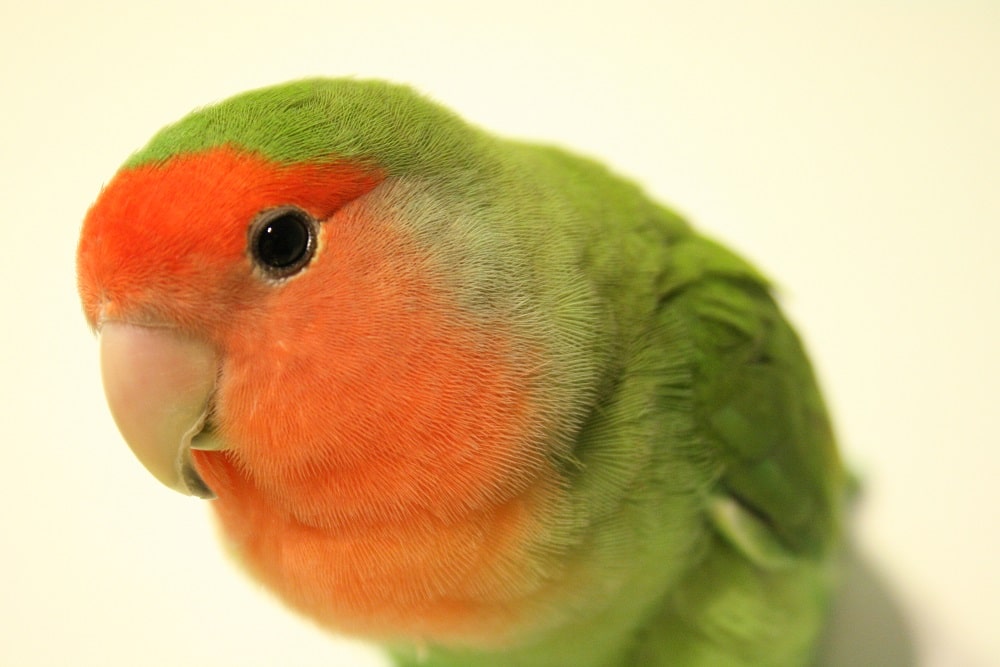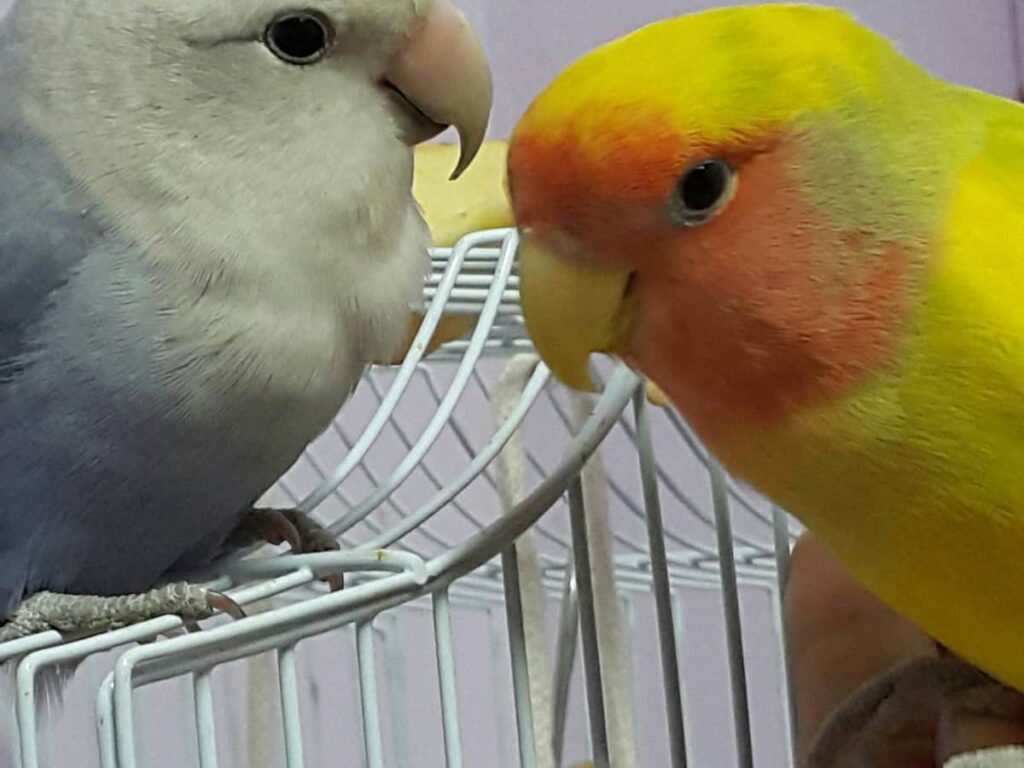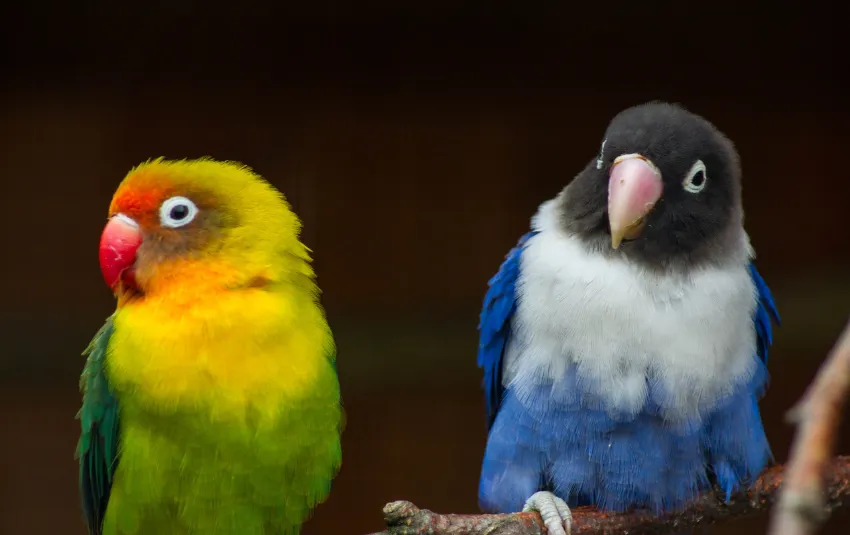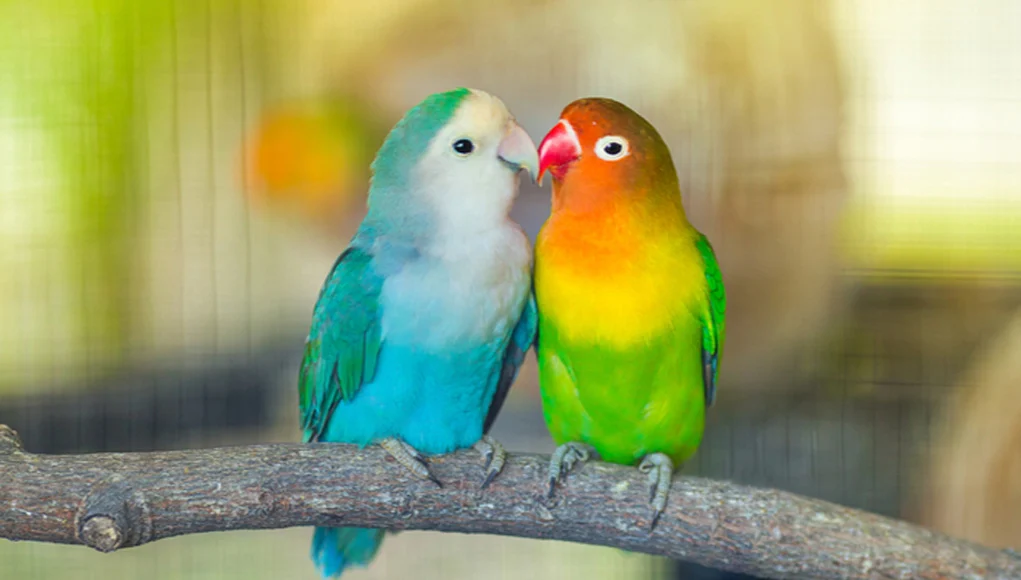Discover the fascinating world of lovebirds and their unique. Learn about colorful parrots express Explore the intriguing question: Do lovebirds talk.
Introduction
Welcome to the world of do lovebirds talk, enchanting and charismatic parrots that have captured the hearts of many bird enthusiasts. These small, colorful birds are known for their delightful vocalizations, which often leave people curious about their talking abilities. In this introductory chapter, we’ll provide an overview of lovebirds, discuss the fascination with their communication, and outline the purpose and scope of this article.
Overview of Lovebirds
Do lovebirds talk scientifically classified as Aquaporins, are a genus of small parrots native to Africa. They earned their charming name due to their strong, monogamous bonds with their mates. do lovebirds talk are characterized by their vibrant plumage and playful personalities, making them popular pets among avian aficionados.
The Fascination with Do lovebirds talk Communication
One of the aspects that makes do lovebirds talk so captivating is their communication skills. These birds are highly social and expressive, and their vocalizations play a significant role in their interactions with each other and their owners. While they may not talk in the same way humans do lovebirds talk have a unique way of communicating through chirps, songs, and mimicry.
Purpose and Scope of the Article
The primary purpose of this article is to delve into the intriguing world do lovebirds talk communication, with a particular focus on their do lovebirds talk abilities. We aim to provide comprehensive insights into how lovebirds communicate, whether they can mimic human speech, and what factors influence their talking potential.
As we explore this fascinating topic, we will also present different perspectives, including expert opinions, experiences of lovebird owners, and FAQs to address common questions about lovebird communication. Additionally, we will discuss the broader context of lovebird behavior, their social aspects, and the changes in their communication patterns when kept as pets.
We will continue our exploration, delving into do lovebirds talk natural vocalizations, interactions with other do lovebirds talk, the pleasure of their songs, and their ability to mimic human speech. We will also touch on different perspectives regarding their talking abilities and provide practical insights for those interested in fostering a deeper connection with their feathered companions.
Do lovebirds talk Communication: What to Expect
Do lovebirds talk communication is a fascinating aspect of these small parrots’ lives. we’ll explore what you can expect when it comes to do lovebirds talk natural vocalizations, their interactions with other lovebirds, the pleasure of their songs, and whether they can mimic human speech.
Do lovebirds talk Natural Vocalizations

do lovebirds talk are known for their vocal nature. Their natural vocalizations include a variety of sounds, such as:
- Chirping: do lovebirds talk are highly skilled chirpers. They use chirps to communicate with each other, express excitement, or simply as a way to stay in touch with their mate.
- Whistles: do lovebirds talk can produce a range of melodic whistles. These whistles are often used in social interactions or as a way to get their owner’s attention.
- Squawking: do lovebirds talk can be quite loud at times, and their squawks are often used to alert their flock to potential dangers.
- Purring: do lovebirds talk may purr contentedly when they are relaxed and comfortable.
Interaction with Other Do lovebirds talk
Do lovebirds talk are social creatures that thrive on interaction with their own kind. When they are paired with a mate, they engage in extensive communication, which may include mutual preening, cuddling, and softly chattering with each other. Their vocal exchanges are a vital part of their bonding process and maintaining the relationship.
The Pleasure of Lovebird Songs
Do lovebirds talk songs are a delightful aspect of their communication. These songs can be complex and beautiful, varying from do lovebirds talk. The joy of listening to their songs is a rewarding experience for those who appreciate these avian companions. Each lovebird has its unique song, and some may even incorporate human sounds they’ve picked up.
Can Lovebirds Mimic Human Speech?
While do lovebirds talk are skilled at producing a variety of sounds, their ability to mimic human speech is limited compared to some other parrot species like African Grey Parrots or Budgerigars. Some lovebirds may pick up a word or two, but they are not typically known for their talking abilities. If you’re looking for a parrot that excels in human speech mimicry, do lovebirds talk may not be your first choice.
Different Perspectives on Do lovebirds talk Abilities
In the realm of lovebird communication, there exists a wide array of opinions regarding their talking abilities. This chapter explores the different perspectives on whether lovebirds can talk, offering insights from experts, factors influencing their talking potential, and the personal experiences of lovebird owners.
Expert Opinions on Lovebird Speech Mimicry
Experts in the field of avian behavior have varying opinions on do lovebirds talk capacity to mimic human speech. While lovebirds do have the anatomical capabilities for mimicry, such as a syrinx—the avian equivalent of vocal cords—they are not renowned for their proficiency in this regard. Some experts believe that individual variation plays a significant role, with a few lovebirds demonstrating a limited ability to mimic words or sounds.
Factors Affecting Lovebirds’ Talking Potential
Several factors can affect whether a lovebird will learn to mimic human speech:
- Species Variation: Different species of lovebirds may have varying levels of vocal mimicry. For instance, the Fischer’s lovebird may exhibit more mimicry than the Black-cheeked lovebird.
- Social Interaction: The extent of interaction and socialization with humans can influence their ability to mimic speech. Lovebirds that have more contact with people may be more inclined to imitate words.
- Age and Individual Differences: Younger lovebirds tend to be more adaptable and learn sounds faster. Additionally, some lovebirds may have a natural aptitude for mimicry, while others do not.
- Environment and Encouragement: An environment that encourages vocalization and provides exposure to human speech can enhance a lovebird’s ability to mimic.
Personal Experiences of Lovebird Owners

Many do lovebirds talk owners have shared their personal experiences with do lovebirds talk abilities. While some owners have reported successful instances of their lovebirds mimicking words or phrases, others have found their do lovebirds talk to be more interested in chirping, whistling, or producing melodious songs. It is not uncommon for lovebirds to display individual differences, with some becoming proficient mimics while others remain relatively silent in terms of human speech.
The variety of experiences highlights the uniqueness of each lovebird’s personality and vocal preferences. While talking abilities can vary among lovebirds, their charming and vocal nature continues to endear them to their owners.
we will further explore the intricacies of lovebird communication, addressing common questions about their vocalization, training, and the care and interaction tips for these captivating avian companions.
FAQs About Lovebird Communication
We’ll dive into frequently asked questions about lovebird communication. From their potential to learn human speech to their chatty nature, we’ll address common queries and provide insights into the world of these delightful avian companions.
Can Lovebirds Learn to Talk Like Parrots?
Do lovebirds talk while known for their vocal nature, are not typically considered expert talkers like some other parrot species. While they may mimic words or sounds to a limited extent, their primary mode of communication is through chirps, whistles, and songs. However, there have been cases of individual lovebirds displaying a knack for mimicry. Patience and consistent training can sometimes yield modest results in this regard.
Are Lovebirds Chatty Birds in General?
Indeed, lovebirds are chatty birds, but their primary audience is usually their own kind. In the wild, they engage in continuous vocalizations with their mate and flock members. Their conversations are filled with chirps, whistles, and soft chatters. When kept in captivity, they may also engage in these vocal exchanges with their owners, although the extent of their chattiness can vary from one lovebird to another.
Do Lovebirds Talk to Show Affection?
Lovebirds are affectionate creatures, and their vocalizations play a role in expressing their emotions. They may chirp or sing when they are content or excited, especially when they are interacting with their mate or owner. While their vocalizations are not the same as verbal expressions of affection, they do use sound to connect with those they love.
Can Lovebirds Be Trained to Speak?
Training do lovebirds talk to speak can be a challenging endeavor, but it’s not impossible. If you’re interested in teaching your lovebird to mimic sounds or words, consistent training and positive reinforcement are key. Some lovebirds may be more receptive to training than others, and the results can vary. It’s essential to be patient and keep training sessions short and enjoyable.
How to Encourage Lovebirds to Mimic Sounds?
Encouraging do lovebirds talk to mimic sounds involves creating a conducive environment for vocalization. Here are some tips:
- Provide Auditory Stimulation: Play music or recordings with the sounds you want your lovebird to mimic. They may pick up sounds they hear frequently.
- Speak Clearly: When interacting with your lovebird, enunciate words and phrases you’d like them to learn.
- Repeat and Reward: Repetition is crucial. Repeat the words or sounds you want your lovebird to mimic and reward them with treats or positive reinforcement when they make an effort.
- Be Patient: Remember that not all lovebirds will become proficient talkers. Appreciate their natural vocalizations and the sounds they enjoy making.
Understanding Lovebird Behavior

Understanding lovebird behavior is a crucial aspect of ensuring their well-being and a harmonious relationship between you and your feathered friends. In this chapter, we’ll explore the social dynamics of lovebirds, their vocalizations in the wild, and how their communication changes when they are kept in captivity.
Social Aspects Do lovebirds talk
Lovebirds are known for their strong social bonds. In the wild, they form deep connections with their mates and flock members. These bonds are essential for their survival and well-being. Lovebirds are often seen preening each other, cuddling, and engaging in mutual grooming as signs of their affection and social harmony. Their vocalizations play a vital role in maintaining these bonds.
Do lovebirds talk Vocalizations in the Wild
Lovebirds are not just colorful and charming; they are also incredibly vocal. In their natural habitat, you can hear them chattering, chirping, and whistling throughout the day. These vocalizations serve various purposes, including:
- Communication with Mates: do lovebirds talk use their vocalizations to communicate with their mates. These exchanges help in strengthening their bond and maintaining their relationship.
- Territorial Announcements: do lovebirds talk are known to be territorial birds, and their vocalizations often serve to establish and defend their territory.
- Warning Calls: When there’s a potential threat, do lovebirds talk emit warning calls to alert the flock. This collective warning system helps them stay safe from predators.
- Maintaining Flock Cohesion: Vocalizations are also a way for do lovebirds talk to stay connected within their flock. This ensures that no member gets left behind when the flock is on the move.
Lovebirds in Captivity: Communication Changes
When do lovebirds talk are kept in captivity as pets, their communication patterns can change. They may transfer some of their natural behaviors, such as bonding and vocalizations, to their human owners. However, there are several factors that influence how lovebirds communicate in a home setting:
- Bonding with Humans: do lovebirds talk often form strong bonds with their human caretakers. They might mimic human sounds and speech as a form of bonding and social interaction.
- Imitating Household Noises: do lovebirds talk may start imitating household noises, such as doorbells or phone ringtones, adding a touch of unexpected amusement to your home.
- Interaction with Other Birds: If you have multiple lovebirds or other pet birds, they may engage in vocal exchanges among themselves, mimicking their wild behaviors.
- Individual Variations: Each do lovebirds talk has its unique personality and communication style. Some may be more vocal and interactive than others.
The Joy of Owning Do lovebirds talk

Owning lovebirds is a delightful experience that goes beyond their talking abilities. we’ll explore the profound bond between lovebird owners and their pets, how lovebirds express themselves beyond speech, and essential tips for their care and interaction.
The Bond Between Lovebird Owners and Their Pets
Lovebirds are renowned for their ability to form strong bonds with their human caretakers. These bonds often result in affectionate and deeply rewarding relationships. Here’s what you can expect when you own lovebirds:
- Affectionate Companions: do lovebirds talk thrive on interaction and can become extremely affectionate. They enjoy cuddling, preening their owners, and even engaging in playful activities.
- Unwavering Loyalty: Once a bond is established, lovebirds exhibit unwavering loyalty to their owners. They often seek comfort in your presence and are known to pine when separated.
- Emotional Connection: do lovebirds talk are known for their emotional intelligence. They can sense your mood and respond to it, offering solace or joyful companionship as needed.
- Social Interaction: do lovebirds talk are highly social birds, and they appreciate spending time with their human family members. Whether it’s watching TV together or simply sitting on your shoulder, they relish the interaction.
Do lovebirds talk Express Themselves Beyond Speech
While lovebirds may not match parrots in speech mimicry, they possess other means of expression that are equally endearing:
- Feather Ruffling: Lovebirds often ruffle their feathers in a content manner, akin to a cat’s purring. This is a sign of comfort and happiness.
- Playful Behavior: Lovebirds are playful creatures. They enjoy toys, swings, and mirrors. Their playful antics can be incredibly entertaining.
- Sharing Food: Sharing food is a bonding behavior for lovebirds. They may offer you a tidbit of their food as a sign of trust and affection.
- Courtship Displays: If you have a pair of lovebirds, you may witness their courtship displays, which involve mutual preening, sharing food, and affectionate chirping.
Do lovebirds talk Care and Interaction Tips
Caring for lovebirds is a responsibility that comes with immense rewards. Here are some tips to ensure their well-being and happiness:
- Diet: Provide a balanced diet that includes pellets, fresh fruits, vegetables, and the occasional treat. Avoid avocados and chocolate, as they can be toxic to birds.
- Cage: Ensure a spacious and well-ventilated cage. Lovebirds are active and need room to move and explore.
- Toys: Keep them engaged with a variety of toys and puzzles to prevent boredom.
- Interaction: Spend quality time with your lovebirds daily. Whether it’s talking to them, playing, or simply being present, your interaction is vital.
- Healthcare: Schedule regular check-ups with an avian veterinarian to monitor their health and well-being.
